Literature and Religion
Leona Foxx Suspense Thrillers
The Wolves of Jack London
with Ted Peters
Literature and Religion

The field–called “Literature and Religion” or “Religion and Literature” or “Literature and Theology” or even “Theology and Literature“–has excited me since my graduate school days. When a student at the University of Chicago, I had the opportunity and honor to study with Nathan A. Scott, one of the progenitors of this field. Under Scott’s tutelage, I could apply the theology-of-culture developed by theologians Paul Tillich and Langdon Gilkey to literary analysis. This method, theology-of-culture, provides lenses through which one can perceive the religious depth underlying otherwise secular discourse. I have employed this method when reading America’s most widely read author in the first quarter of the last century, Jack London.
Now, to some it might appear that religion has no relation to literature. After all, the religions we know take institutional form with creeds, beliefs, symbols, and traditions. Right? Yes, this is one way to use the term, ‘religion’. However, religious or spiritual sensibilities that are universal in human experience underlie such institutional religion. That’s what we want to get at with a theology-of-culture. “I wish also to recover a sense of the theological importance of the enterprise,” writes David Jasper in his The Study of Literature and Religion. “And not in the sense that this necessarily implies that kind of intellectualism which correlates religious faith with mere assent to a body of propositions, or the loss of freedom.”
So, Paul Tillich’s theology-of-culture penetrates the depth of literary expression along with other artistic expression to uncover underlying religious sensibilities. Theology of Culture (Kulturtheologie), said Tillich already at the close of World War I, recognizes that the religious dimension actualizes itself in every dimension of the Spirit (Sondern das Religiöse ist aktuel in allen Provinzen des Geistigen) (Tillich 1919, 2:73). Therefore, theology of culture “is the attempt to analyze the theology behind all cultural expressions, to discover the ultimate concern in the ground of a philosophy, a political system, an artistic style, a set of ethical or social principles. This task is analytic rather than synthetic, historical rather than systematic” (Tillich, Systematic Theology 1951-1963, 3:158).[1]
Why might the theology-of-culture method work so well? Because, as Ralph C. Wood, a former Scott student and now a Baylor University professor, avers, “The natural order is never autonomous but always and already graced” (Wood, 2008). By digging into the depths, the literary critic can discover divine grace because it’s already there.[2]
When I became a fiction author, however, I found the theology-of-culture method baffling. It’s one thing to analyze. It’s quite another to construct. Oh, I could handle the plot just fine. But, deliberately exploiting subtle connotations, undertones, and nuances seemed contrived, some how. This led me to surmise that great novelists most likely write intuitively, maybe even mystically.
In this master page on Literature and Theology, you will find my own espionage writings plus my analysis of the wolf troika of Jack London: The Call of the Wild, White Fang, and The Sea Wolf. In both writing and reading, the depth I’m looking for is to be found not only in religion, but also in science. To be more precise, science itself can exude religious valence. That’s what the theology-of-culture uncovers and makes visible.
Leona Foxx Suspense Thriller Series
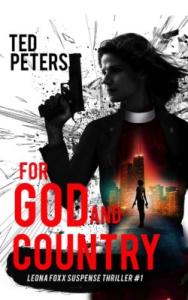
Click here.
For God and Country: Leona Foxx Suspense Thriller #1
“God.” She started a prayer. Her thoughts drifted. As if in a theater seat, she watched her life’s past dramas. The faces of the three young men who put her life in peril at the Cheltenham station flashed on her mental stage. She relived the terrifying moment she saw the northbound train about to decapitate her. Then Orpah Tinnen walked into the scene. Leona thought of her son, Magnus, decapitated by the Iranian military. She remembered her moment in the church kitchen, her moment of remembrance of the blood-spattered chest of the executed prisoner.
“God,” she muttered. She paused. “God, you have got such a fucked up world. Why did you put me here like a pin cushion to feel every prick of its pain? Yes, I want to love your world as much as you do. But, goddammit, it’s hard. I’d like to ask the Holy Spirit for the wisdom and strength to trust in what I cannot see. But, goddammit, I’m too pissed off to think it’s worthwhile. I hope your grace covers me. Amen.”
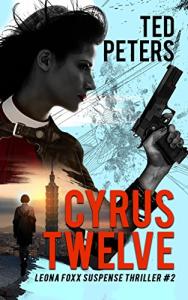
Cyrus Twelve: Leona Foxx Suspense Thriller #2
Leona Foxx is a black op with a white collar, who worships at two altars, her country and her God. She fights with ferocity for both.
The woman pastor from Chicago, Leona Foxx, takes on renegade Transhumanists making themselves kingmakers by selling espionage technology. Leona’s strategy is to turn superintelligence against itself in order to preserve global peace. Can a mere human prevail against the posthuman?
If you want to grasp the promises and risks of enhancing human intelligence given us by our transhumanist friends, read Cyrus Twelve.
The Moon Turns to Blood – Leona Foxx Suspense Thriller #3
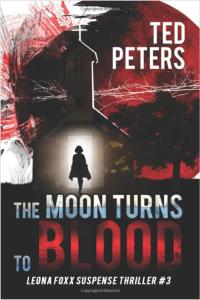
Blood sacrifice. Could there be anything more evil? What happens when the symbols of grace get turned upside down? Are we left without hope?
Set in the Adirondack Mountains, the clash between good and evil escapes its local confines to threaten the nation and even engulf the globe. The selling of souls to perdition fuels the fires of hell so that we on Earth cannot avoid the heat.
Discover and memorize Leona’s Law of Evil: You know it’s the voice of Satan when you hear the call to shed innocent blood. On the shores and islands of Lake George, certain ears hear this call. Leona swims into action to stop the bloodshed.
The Wolves of Jack London
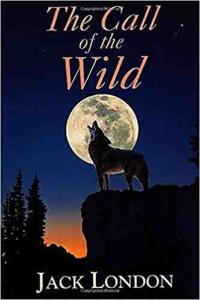
Nature is blood “red in tooth and claw.” Although these are the words of poet Alfred Lord Tennyson in the dinosaur canto of his In Memoriam, Jack London (1876-1916) conveyed their truth with convulsive drama, vicious gore, and unspeakable cruelty.
In what I nickname London’s Wolf Troika, we read in The Call of the Wild how a San Francisco dog, Buck, goes to Alaskan and becomes a wolf. In the next, White Fang, an Alaskan wolf, moves to San Francisco and becomes a dog. In the third of the troika, The Sea Wolf, a Danish ship captain named Wolf Larsen exhibits the traits of both civilized human and atavistic beast. Framed in terms of Darwinian evolution, London’s characters demonstrate that the primeval wolf lives on today in both our dogs and our dog owners.
London’s moral is this: never rest unawarely with peaceful civilization. At any moment civilization can erupt like a volcano and extravasate wolf-like fury, barbarity, and savagery. Our evolutionary past ever threatens to rise up with consuming cruelty, demolishing all that generations have patiently put together. Within the language of evolution, London describes original and inherited sin.
As an addendum, I add what may be the final short story London wrote, “The Red One.” When we to turn “The Red One” of 1916, it appears London was hoping for grace from heaven.
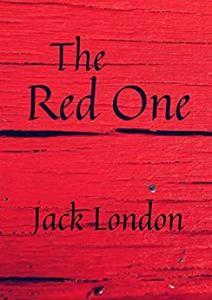
Now, London was a Darwinian naturalist. Not overtly religious. Yet, London intuitively recognized our desperate need for grace. On our own, our human species is unable to evolve fast enough or advance far enough to escape our wolf genes. Might visitors from heaven provide a celestial technology that could—by grace—lead to our transformation? Might grace from heaven come in the form of a UFO from outer space? Four decades before the June 1947 sighting of flying saucers, London’s imaginative mind was soaring to extraterrestrial civilizations that could save us from ourselves on earth.
Devin Zuber, who teaches American Studies, Religion, and Literature at the Graduate Theological Union, sees the point I would like to make. “Even within Jack London’s most secularized and Darwinian aesthetic, the spiritual value of wilderness allowed a residue of an original religious impulse to remain“(Zuber, 2019, 102).
The Jack London Society
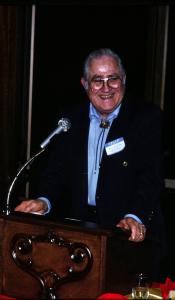
Because my method in Literature and Religion relies on a theology-of-culture, I’m searching for treasures different from other London interpreters. I’ve come to admire two generations of Jack London aficionados and scholars who have fertilized and pruned this literary tradition. I feel privileged to have met some of the Jack London Society sockdolagers such as Russ and Winnie Kingman, who produced A Pictorial Life of Jack London.
Over the years I’ve benefited greatly from devouring essays and books by Earle Labor, Jeanne Campbell Reesman, Clarice Stasz, Richard Rocco, Kenneth Brandt, and others. I’ve begun reading the multi-volume behemoth of an intellectual biography of Jack London, Author Under Sail, by Jay Williams. There are more facts in William’s compilation than the Encyclopedia Britannica could dream of. And, of course, don’t miss Jay Craven’s new film, “Jack London’s Martin Eden.”
I am currently working on this Patheos series dealing with Jack London’s Wolf Troika. Here is what to expect.
THE WOLVES OF JACK LONDON / Jack London Society

Jack London 1: The Call of the Wild
Jack London 4: Lone Wolf Ethics
Jack London 5: Wolf Pack Ethics
Jack London 6: Wolf & Lamb Ethics
Literature and Religion: both writing and reading in search of divine grace.
▓
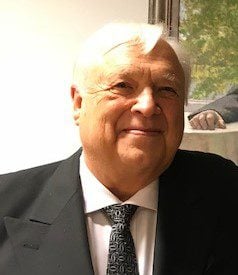
Ted Peters pursues Public Theology at the intersection of science, religion, ethics, and public policy. Peters is an emeritus professor at the Graduate Theological Union, where he co-edits the journal, Theology and Science, on behalf of the Center for Theology and the Natural Sciences, in Berkeley, California, USA. His book, God in Cosmic History, traces the rise of the Axial religions 2500 years ago. He previously authored Playing God? Genetic Determinism and Human Freedom? (Routledge, 2nd ed., 2002) as well as Science, Theology, and Ethics (Ashgate 2003). He is editor of AI and IA: Utopia or Extinction? (ATF 2019). Along with Arvin Gouw and Brian Patrick Green, he co-edited the new book, Religious Transhumanism and Its Critics hot off the press (Roman and Littlefield/Lexington, 2022). Soon he will publish The Voice of Christian Public Theology (ATF 2022). See his website: TedsTimelyTake.com. His fictional spy thriller, Cyrus Twelve, follows the twists and turns of a transhumanist plot.
▓
References
Tillich, Paul, 1919. Über die Idee einer Theologie der Kultur” in Main Works/Hauptwerke, Carl Heinz Ratschow, editor in chief. 6 Volumes: Berlin and New York: De Gruyter—Evangelishces Verlagswerk GmbH, 1989) 2:69-86.
Tillich, Paul, 1951-1963. Systematic Theology. 3 Volumes: Chicago: University of Chicago Press.
Ward, Graham, 2000. Theology and Contemporary Critical Theory. Switzerland: Springer.
Wood, Ralph C., 2008. Literature and Theology. Nashville TN: Abingdon.
Zuber, Devin P., 2019. The Language of Things. Charlottesville VA: University of Virginia Press.
Notes
[1] Theology is reflection on religion and culture. The theology-of-culture is still theology. “There can be no theology without language,” touts Graham Ward. “There may be religious experience in some microsecond when self-consciousness is silenced and the self dissolves into the transcendent; but theology arises with the return of reflection. Theology needs and employs concepts, names, ideas, metaphors, grammar – in short, rhetoric. It requires a discourse and all discourses are culturally embedded. For concepts, names, ideas and metaphors change within, disappear from and emerge into particular historical and social conditions. Theology arises, then, from both the recognition that we are being spoken to by that which is other and exterior to ourselves and the conscious appropriation of that event, or speech-act”(Ward, 2000, 2).[2] The method, theology-of-culture, can identify religious depth below a superficial secular surface. “The sacred and secular are regularly commingled,” says Mark Knight in “Religion and literature in a secular age.” There are “myriad of ways in which the Christian faith jostles with other systems of belief. Untangling these different threads can be difficult, and it would be a mistake to think that the sacred and secular can ever finally be separated.”














